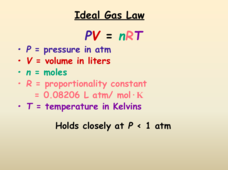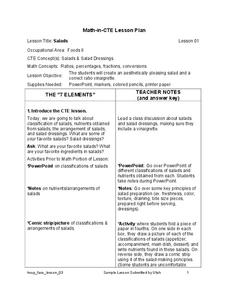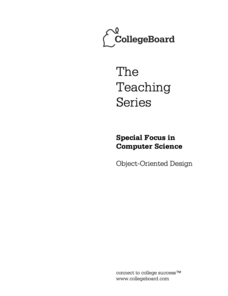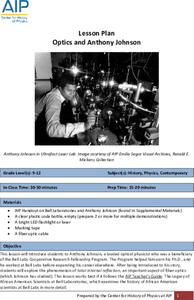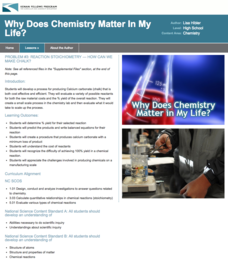Science Geek
The Ideal Gas Law
When doing a gas lab, you might feel under pressure. A short presentation discusses the Ideal Gas Law. It begins with the units for each variable, then describes the behavior of real gases. The lesson concludes with a comparison of...
National Park Service
Erosion
A set of PowerPoint slides supports a lecture or class review of weathering and erosion. Viewers learn the definition of each and examine various photos for evidence. Erosion is further depicted as caused by wind, water, and ice....
Howard Hughes Medical Institute
The Making of the Fittest: Evolving Switches, Evolving Bodies
How did the stickleback fish, which was once ocean bound, evolve to be able to persist in freshwater lakes? Hear from the scientists who identified the genes and related switches that allowed these survivors to adapt. In addition to the...
Virginia Department of Education
Acid-Base Theory
Litmus paper, why so blue? A chemistry lesson includes a pre-lab activity, practice calculating pH, an experiment measuring the pH in acids and bases, a titration demonstration, and a titration experiment.
Steinhardt Apps
Kinetic Molecular Theory
Building off young chemists' knowledge of the states of matter, kinetic molecular theory is the focus of the unit. Eight days of lessons including multiple demonstrations, one lab experiment, directed instruction, and worksheets,...
Columbus City Schools
Let’s Get Theoretical About Cells
Get up close and personal with cells in a hands-on journey to discover what makes up living things. Scholars learn valuable microscope skills, delve into the Modern Cell Theory, and gain insight into how cells reproduce. The included lab...
Channel Islands Film
Cache: Lesson Plan 1 - Grades 9-12
Archaeologists have discovered a cache of Native American relics. They want to preserve these relics by removing them from the rapidly eroding site to a lab where they can be studied. Native American traditions demand that the items be...
Next Generation Science Storylines
Why Do Some Things Get Colder (or Hotter) When They React?
Some reactions absorb heat while others release it. Young scholars investigate both types of reactions in a 12-lesson unit. Each lesson presents a lab investigation that monitors temperature and considers the types of reactions taking...
National Research Center for Career and Technical Education
Salads
Lettuce talk for a moment about your culinary scholars; do they have what it takes to create a great salad? Show them the finer points of salad preparation with a career and technology lesson that combines direct instruction, creativity,...
College Board
Using the Java Collections Hierarchy
Collect a set of collections. Professional development material provides teachers with information about collections that are in AP Computer Science. Materials include teaching strategies, sample labs, and worksheets. Educators use the...
College Board
Object-Oriented Design
Just jump in with both feet. To better teach Java, one must think Java. The College Board built document immerses teachers in object-oriented design by providing several resources for use. Resources include teaching strategies, design...
Center for History Education
The Triangle Shirtwaist Factory Fire: Is Anyone to be Punished for This?
The stories of bodies falling to the pavement and girls dying in their seats echo to the present day. The New York City Triangle Shirtwaist Factory fire—which killed 147 people, mostly young women and girls—galvanized the labor movement...
Center for History Education
Cold War Case Files: The Rosenberg Trial - Was Justice Fairly Served?
The Rosenbergs—executed for their role in a Soviet-era spy ring—continue the captivate the American imagination. Using a history lab format, young historians examine the trove of documents associated with the case, including photographs...
Center for History Education
Guatemalan Coup of 1954: How Did the Cold War Influence American Foreign Policy Decisions?
Was it all about the bananas—or the fear of a communist threat? Young historians use a history lab to examine documents from the American-led 1954 Guatemalan coup. Using graphics, government documents, and speeches, they examine the...
American Institute of Physics
The Physical Sciences at Historically Black Colleges and Universities
The history of science instruction at Historically Black Colleges and Universities (HBCUs) is the focus of a instructional activity that explores the early challenges these institutions faced in accessing equipment for their labs and...
American Institute of Physics
Optics and Anthony Johnson
Message sending has come a long way since the days of Morse code's dots and dashes. Young scientists study the research of optical physicist Anthony Johnson and his work in fiber optics, lasers, and the principle of total internal...
Columbus City Schools
ABC: Acid Base Chemistry
Bubble, bubble, boil and trouble! What causes common substances like baking soda and vinegar to react the way they do? Welcome your junior chemists to the wonders of acid-base chemistry using a comprehensive and fun resource. Engage them...
SRI International
Nanofiltration
How can everyone in the world have access to clean drinking water? Throughout the lesson plan, learners read about and listen to how water is filtered, what the filtration process removes, and the best ways to filter. They explore the...
Science 4 Inquiry
Enzymes in Action
Enzymes play a role in almost every function in the human body. Scholars explore three variables related to the use of enzymes. They observe a catalase reaction, experiment with substrates, and examine reactions rates.
Curated OER
Earthquakes: Second Grade Lesson Plans and Activities
What causes earthquakes? Second graders learn about stresses from plate movement with a set of hands-on activities. After tracing fault lines on a map with yarn, class members create a paper plate model of Earth to show its layers and...
Curated OER
Hazards: Kindergarten Lesson Plans and Activities
The last unit in the series allows kindergarteners to see the dangers and hazards associated with each of the natural disasters learned so far in the series—earthquakes and volcanoes. They listen to sounds associated with the disasters.
Kenan Fellows
Microorganisms in Pond Water
That is living in the water? Groups of two to three view pond water with microscopes in order to find microorganisms. They draw pictures of the ones they find in their slides. The groups compare their drawings to pictures of common pond...
Science 4 Inquiry
The Yin and Yang of Photosynthesis: Day vs. Night
Floating fragments of elodea can grow even without roots. Young scientists use eldoea plants to observe the oxygen production from photosynthesis. They study the difference between having access to high amounts of light and low amounts...
Kenan Fellows
Reaction Stoichiometry—How Can We Make Chalk?
What is a reasonable percent yield in the manufacturing process? Scholars develop a process for producing chalk in the third lesson of a six-part series. Then, they must determine the theoretical and percent yield. Discussions about...
Other popular searches
- Lab Safety
- Biology Lab
- Diffusion and Osmosis Lab
- Lab Equipment
- Science Lab Safety Rules
- Science Lab Safety
- Density Lab
- Photosynthesis Lab
- Lab Report
- Scientific Method Lab
- Biology Lab Photosynthesis
- Microscope Lab


